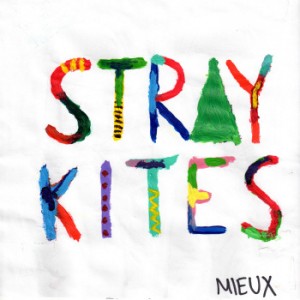 Stray Kites – Mieux
Stray Kites – Mieux
(2011, self-released)
I’ve found this to be true: lo-fi twee bedroom pop can be polarizing. I love the stuff, much of the time . . . for sure, the genre is littered with a lot of bad music, bad lyrics, bad recording, preciousness, etc (what genre isn’t?). That’s part of the bargain of democratized recording technology. But it’s also full of understated brilliance of a sort too quickly dismissed on the first sour note, misplaced beat, strange singer, etc. And as the overall volume of music being made increases, it becomes easier to miss out on some good stuff. Good stuff like Mieux!
Stray Kites is two guys from Virginia: multi-instrumentalists Max Detrich and Junior Roseboro, Junior being the primary songwriter and singer. Mieux is their second lo-fi twee bedroom pop album, and I like it quite a lot. It took a few spins for me to get fully on board but lately it’s started playing in my head at night, unbidden, making me go play it again on their bandcamp.
To summarize: on the first listen you’re presented with a few challenges. it’s lo-fi yes, but what kind? The sound quality is good. There are noises–the band prefers not to edit out the sound of the recorder being stopped and started. You also get samples of rain, people laughing during the sessions, room noise. It’s easy for this sort of thing to turn annoying but it doesn’t. Everything’s on key, the instruments are tuned, the reverb is nice. The vocals are weird at first. Junior has an odd voice, kind of low, kind of far away, almost always double-tracked (and not always in sync). The percussion is also . . . different, definitely not the standard drum kit. Think kitchen sink. Nylon string guitar and various organs/toy pianos are the primary instruments, while a trumpet makes an appearance to great effect on “Talking Plaster Walls Pt. 3” (which might be the prettiest song on the album):
[wp_bandcamp_player type=”track” id=”351186490″ size=”grande” bg_color=”#FFFFFF” link_color=”#4285BB”]
The songwriting tends toward the epic–bright and dark introspective folk ballads. The performances have great energy and feeling and are not flawless. Errors are kept rather than labored over.
Ok, so it’s that sort of lo fi. Which is all to say that the most important thing is the song, but the band won’t punish you too much sonically to make a point of it. Over repeated listens the strongest songs (“Misanthrope,” “Id,” “Plaster Walls”) emerge as particularly strong, and the others fit together to make it a pretty good LP.
